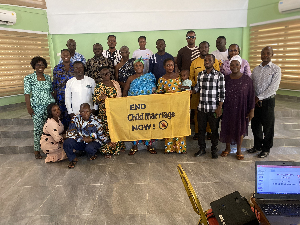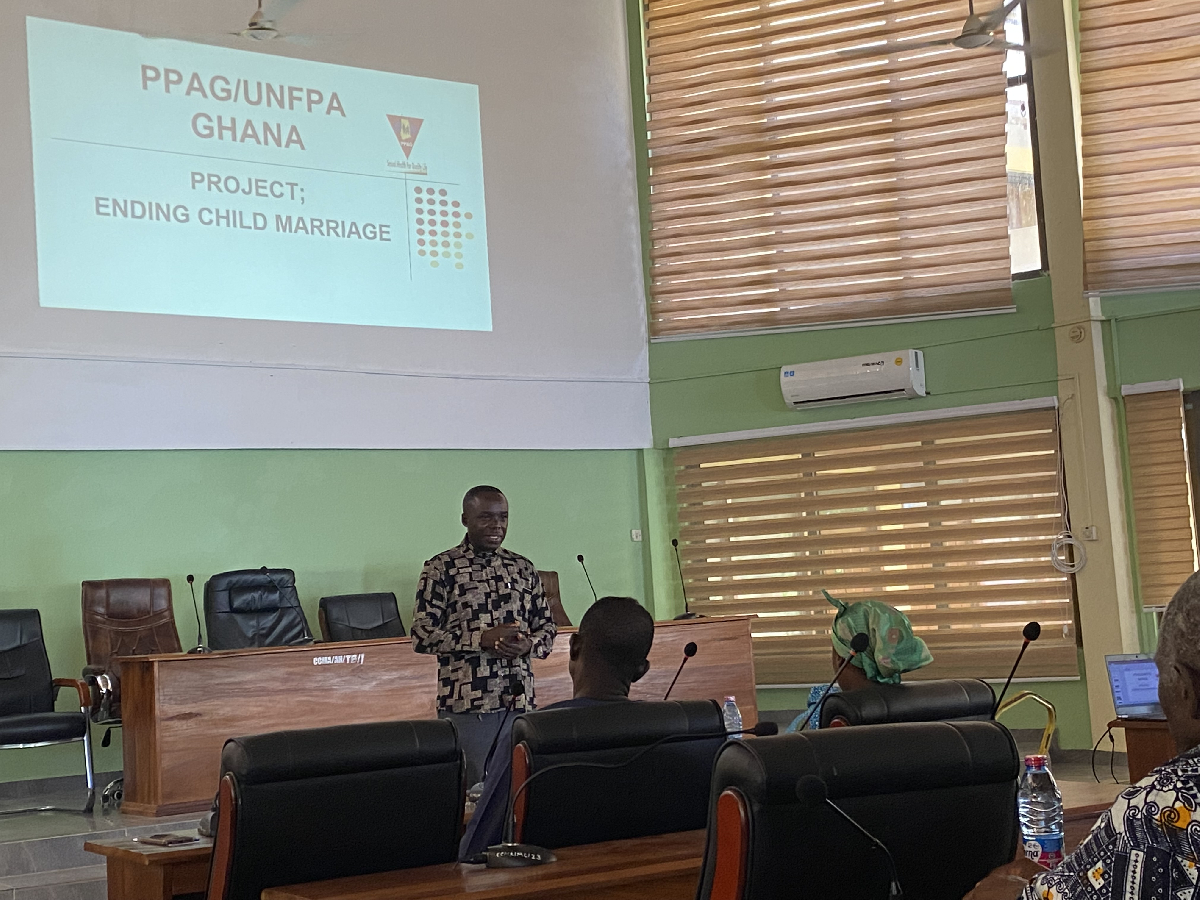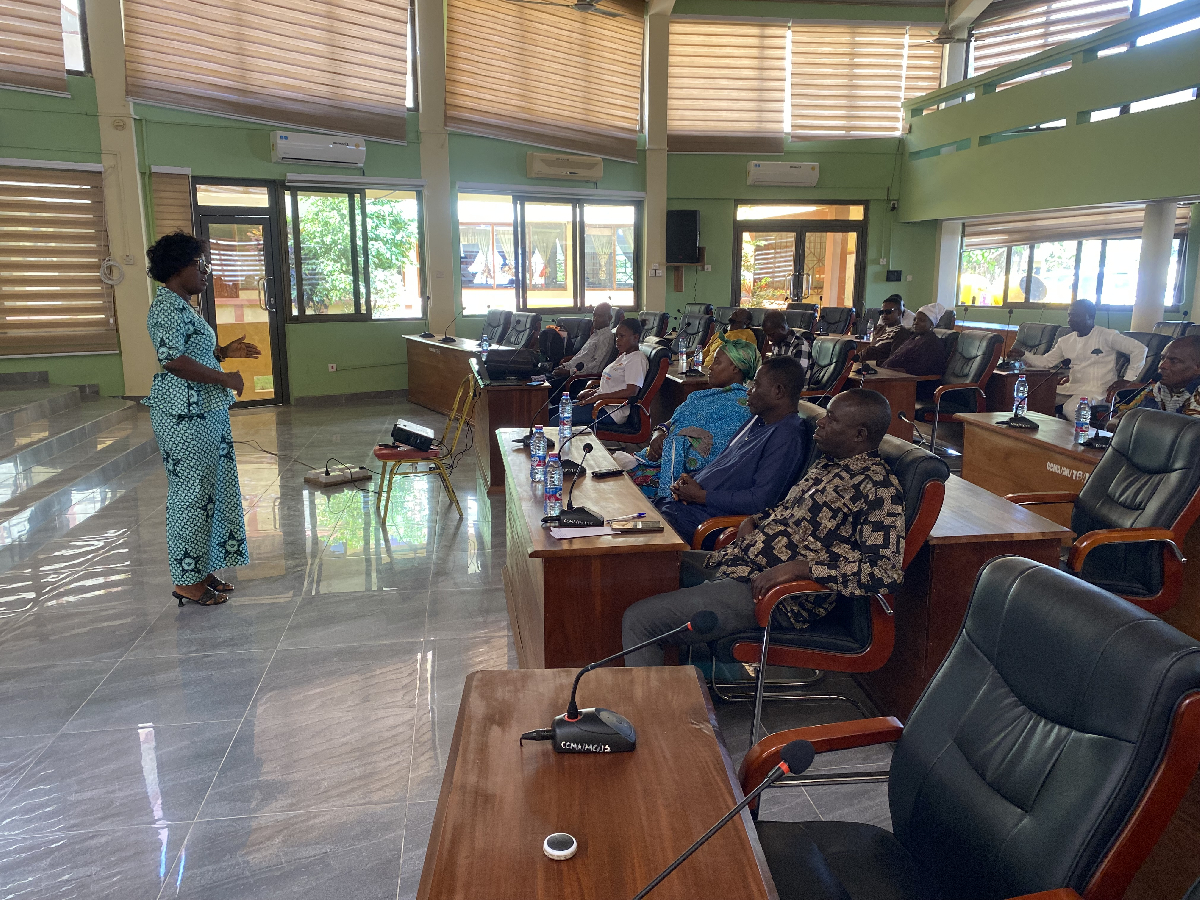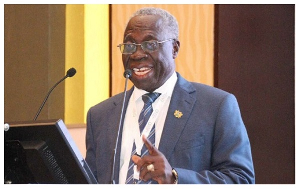DjQwequ Blog of Tuesday, 10 December 2024
Source: Emmanuel Jacob Amissah
Stakeholders In Cape Coast Metropolitan Assembly Collaborate To Reduce Child Marriage And Teenage Pregnancy In The Central Region.

The Ghana Health Service adolescent focal person, madam Dora Jones Yaidoo, thanked PPAG for bringing various stakeholders within the assembly to have a dialogue on early child marriage and teenage pregnancy and how they can all work together in fighting against it in the sub-metro because it is one of the major challenges affecting human development within the subregion and that this initiative is very important.
She was speaking during a pre-implementation meeting with District Child Marriage Elimination Committee members, a program organized by PPAG with partnership and sponsorship from UNFPA at the district assembly hall. Madam said that teenage pregnancy is one of the contributing factors towards maternal and child mortality in Cape Coast metro. For instance, when you take 100,000 pregnant women in Greece, you will only record 2-3 maternal mortalities as compared to Ghana, where when you take 100,000 pregnant women, you can record about 365 maternal mortalities. This is due to the fact that the education level about teenage pregnancy and its implications is very low in Ghana and Cape Coast metro as well.

She added that, when you take the central region, on average we are doing about 19% teenage pregnancy, but when you slow down to the Cape Coast metro, we are doing like 7%, and looking at it, you will think that the Cape Coast metro is doing well by reducing teenage pregnancy, but that’s not the case. If you take a critical look at the situation we can get about 20% but the only reason is that, the bigger institution in Cape Coast like the university of cape coast, the technical university and its surrounding tertiary institution including the various secondary schools account for the elite so there for their surroundings communities records very low percentage in teenage pregnancy because, such communities has a higher education and are well informed about teenage pregnancy as compared to the rural communities which have been recording higher percentages because the education level there is very low, and because the bigger majority population in cape coast covers the elite, when you strike the average you will get something like 7% so you will think cape coast is doing well but it is not.

Teenage pregnancy may be caused by out of violence; for example, some teachers will ask their female students to accompany them to his house with some bags and books, but at the end of the day he will force and have sex with the adolescent girl, which some may lead to teenage pregnancy and child marriage. Another cause of teenage pregnancy is peer pressure. Some of the adolescents tease themselves, asking, Have you tasted sex before? If not, then you are called all sorts of names like John, Colo, Villager, etc., which will force the other party to also try and engage himself/herself in sex, which may cause teenage pregnancy and child marriage. Sexual intercourse is only meant for marriage couples; hence, as an adolescent, leading a chase life is what is best because leading a chase life will help you to abstain from sex and help you to focus on your education, which will not result in pregnancies and child marriage, she cited.
Madam added that poverty can lead to reduced access to quality education, making it difficult for teenagers to acquire knowledge about reproductive health, family planning, and safe sex practices. Again, economic vulnerability also may cause child marriage and teenage pregnancy; thus, teenagers from poor backgrounds may be more vulnerable to exploitation, including transactional sex, which can lead to unintended pregnancies. Also, lack of access to healthcare can also contribute to teenage pregnancy; thus, poverty can limit access to healthcare services, including reproductive health care, making it difficult for teenagers to access contraception, prenatal care, and other essential services.
Cultural and Social Norms: In some poverty-stricken communities, early marriage and childbearing may be seen as a way to secure financial stability or escape poverty.
Madam stated that, to resolve teenage pregnancies and child marriage challenges in Cape Coast Metro, parents must provide the following:
• Education and Awareness
• Access to Healthcare and Family Planning
• Economic Empowerment and Support
• Community and Family Engagement
• Policy and legislative support.
By implementing these strategies, we can work towards the reduction of teenage pregnancy rates and supporting the health, well-being, and development of adolescents in Cape Coast metropolis and Ghana as well.
Mr. Martin Datsomor, the representative from the Commission on Human Rights and Administrative Justice (CHRAJ), also stressed the fact that parental irresponsibility also contributes to teenage pregnancy in Cape Coast metro. In his presentation, he stated that most often some parents demand basic things like soap, money, data, call credit, bags, food, etc. from their teenage girls, knowing very well that these teenagers have not reached the working-class age and do not have the capacity to work and earn income. These girls, trying to provide these items to their parents, end up engaging themselves in transactional sex, which often results in teenage pregnancy and child marriage.
He added that inadequate sex education and lack of supervision also contribute to child marriage and teenage pregnancy; thus, parents may not provide accurate and comprehensive information about sex, contraception, and reproductive health, and again, most parents may not monitor their teenager's activities, leaving them vulnerable to peer pressure and risky behaviors.
Inconsistent discipline and unhealthy relationships: Parents may not set clear boundaries or consequences, leading to a lack of accountability and responsibility, and parents may model unhealthy relationships, demonstrating a lack of respect, trust, and communication.
Substance abuse and irresponsible behavior: Parents may engage in substance abuse, normalizing risky behaviors and increasing the likelihood of teenage pregnancy, and most parents may engage in irresponsible behaviors, such as infidelity or reckless spending, which can influence their teenager's attitudes and behaviors. Lack of open communication and inadequate listening: Parents may not maintain open and honest communication with their teenager, making it difficult to discuss sensitive topics like sex and relationships, and most parents may not listen actively to their teenager's concerns, feelings, and experiences. He cited.
The PPAG field officer for Cape Coast metro, Madam Rebecca Kporxa, thanked the committee members for honoring her invitation towards the program for making it successful and encouraged all the stakeholders to fully participate and share more ideas on how they can collectively work to achieve the goals of the 4th quarter activity project for 2024.


















